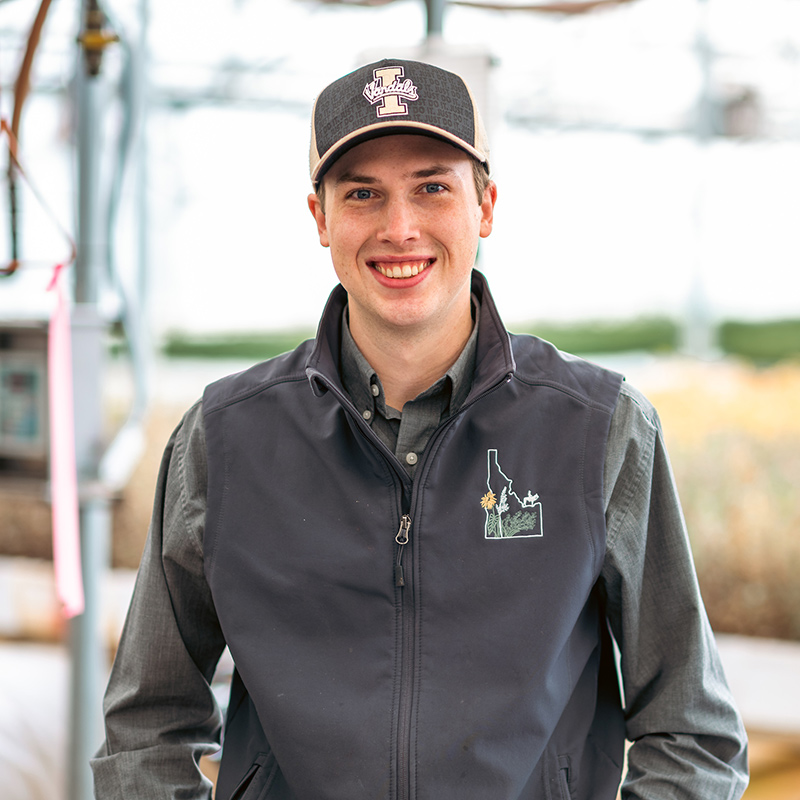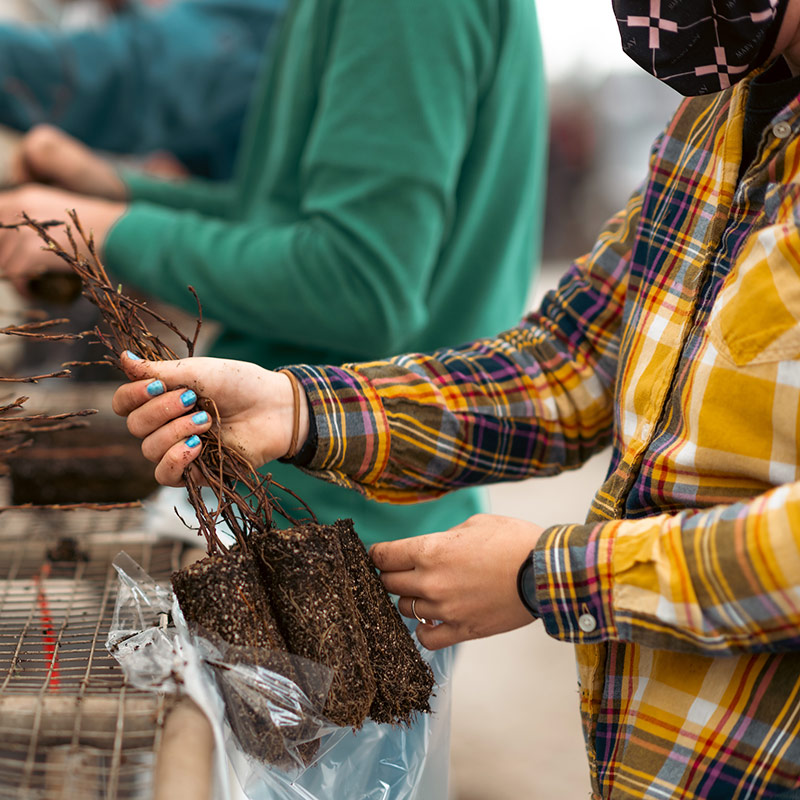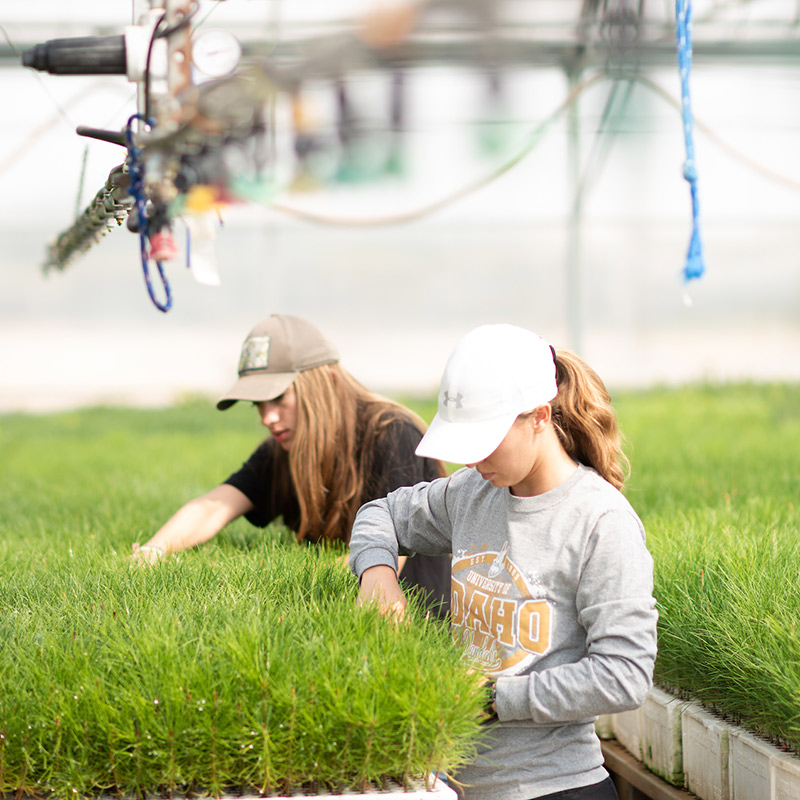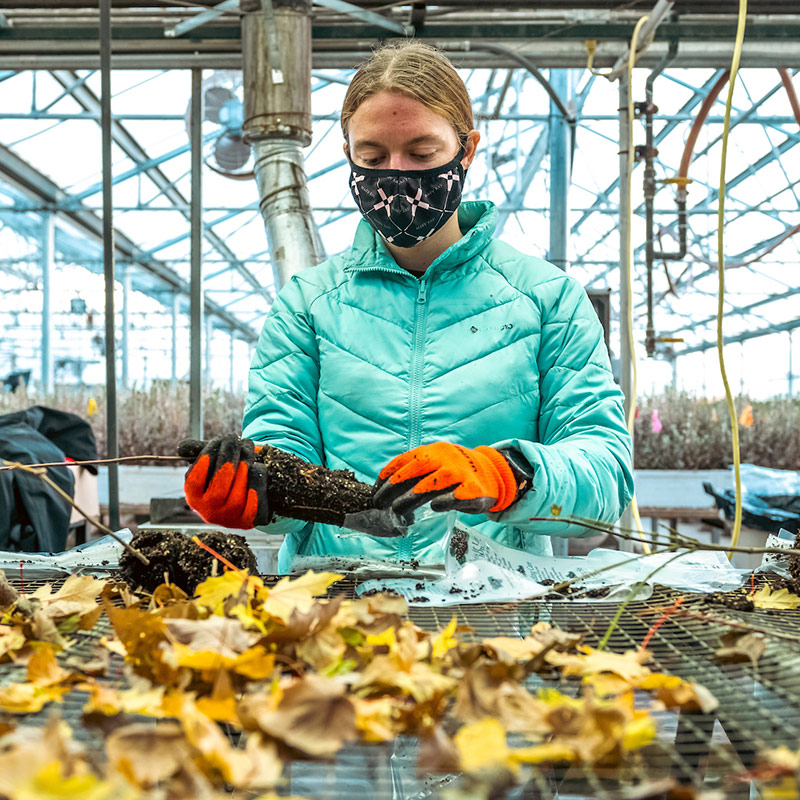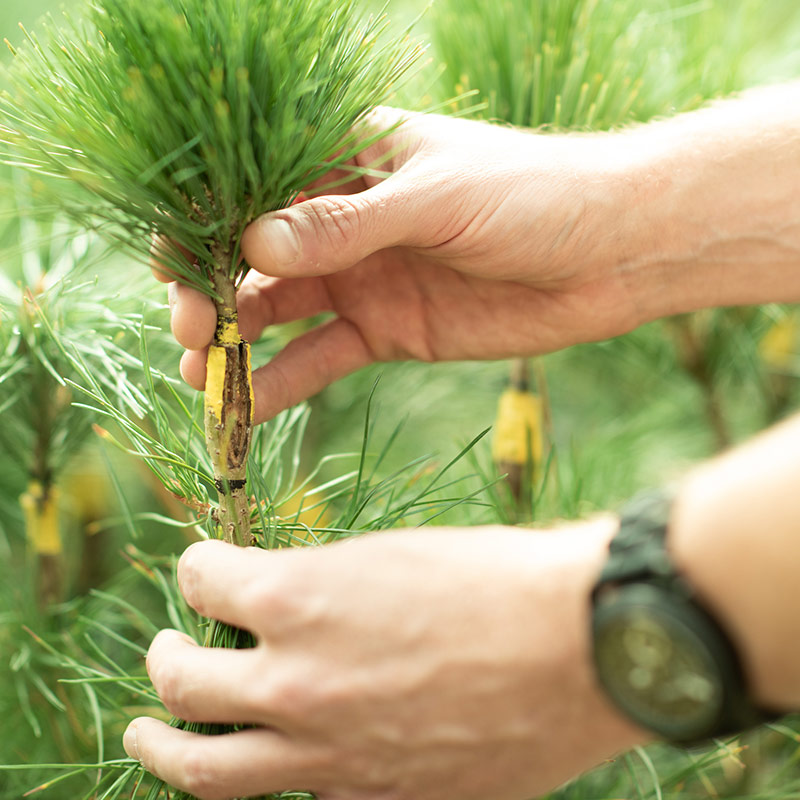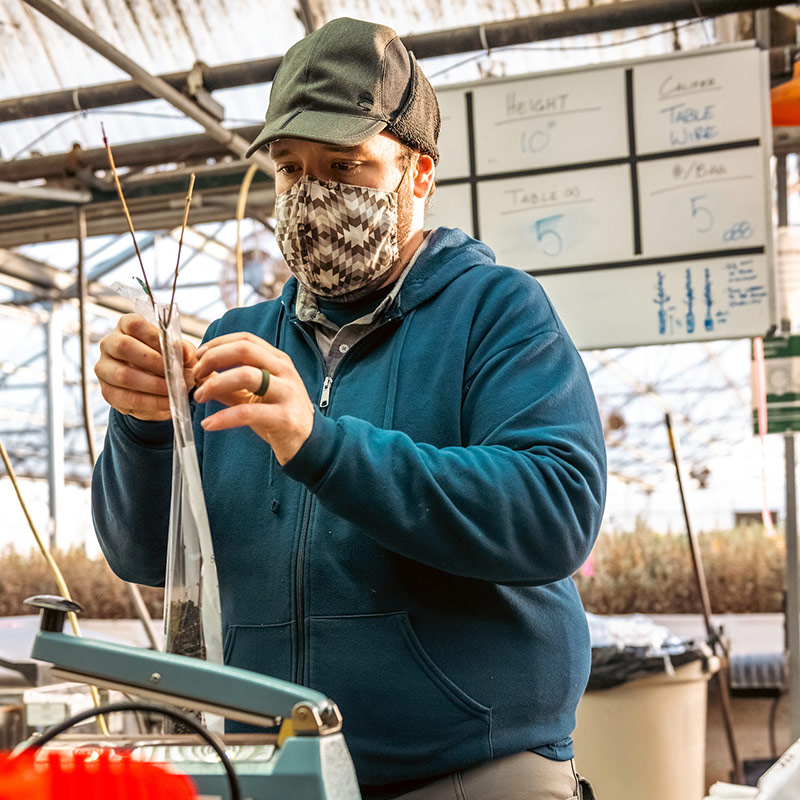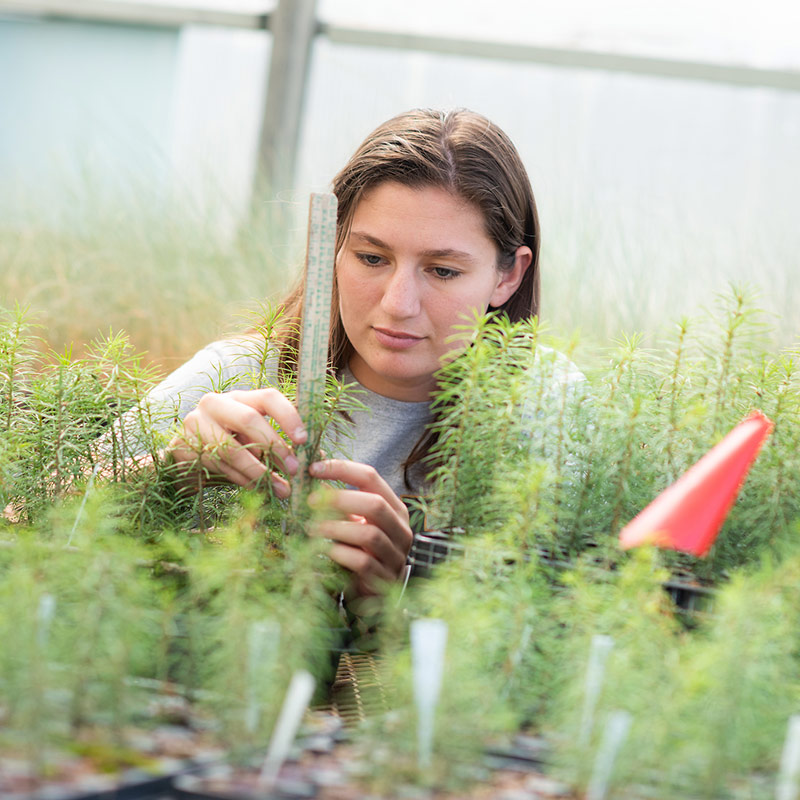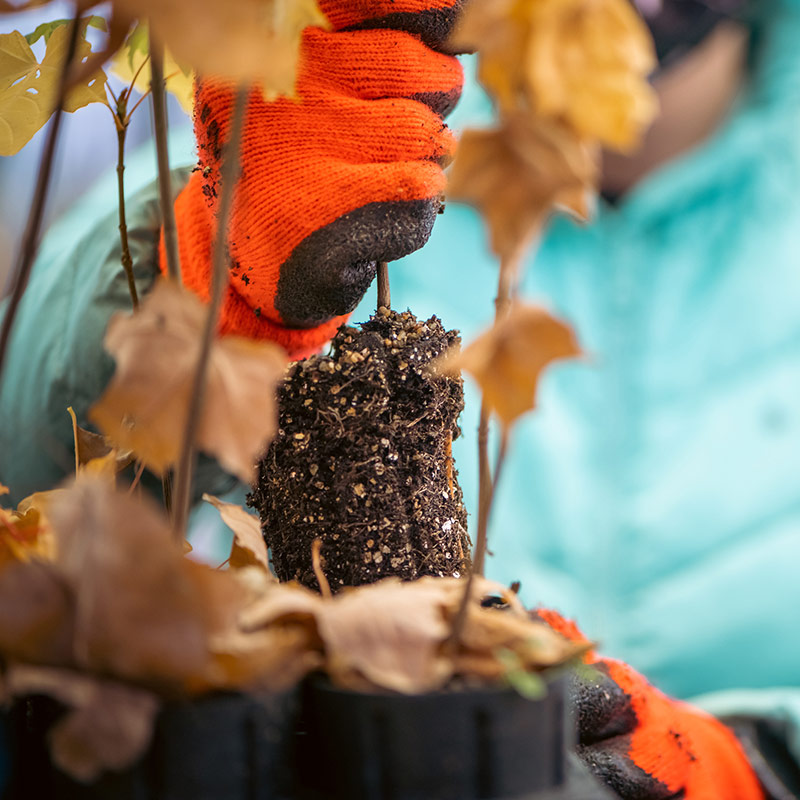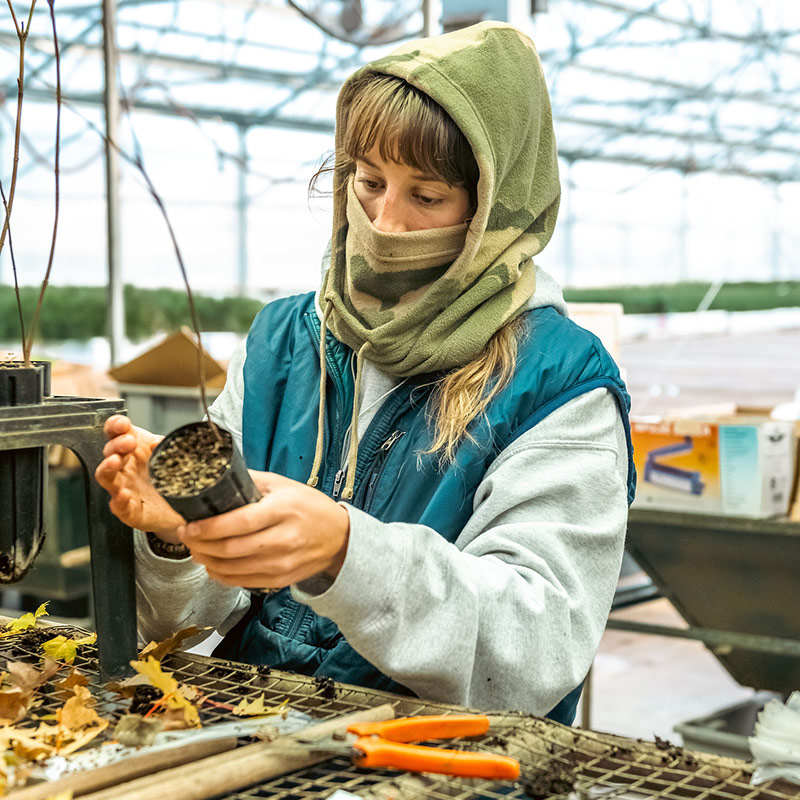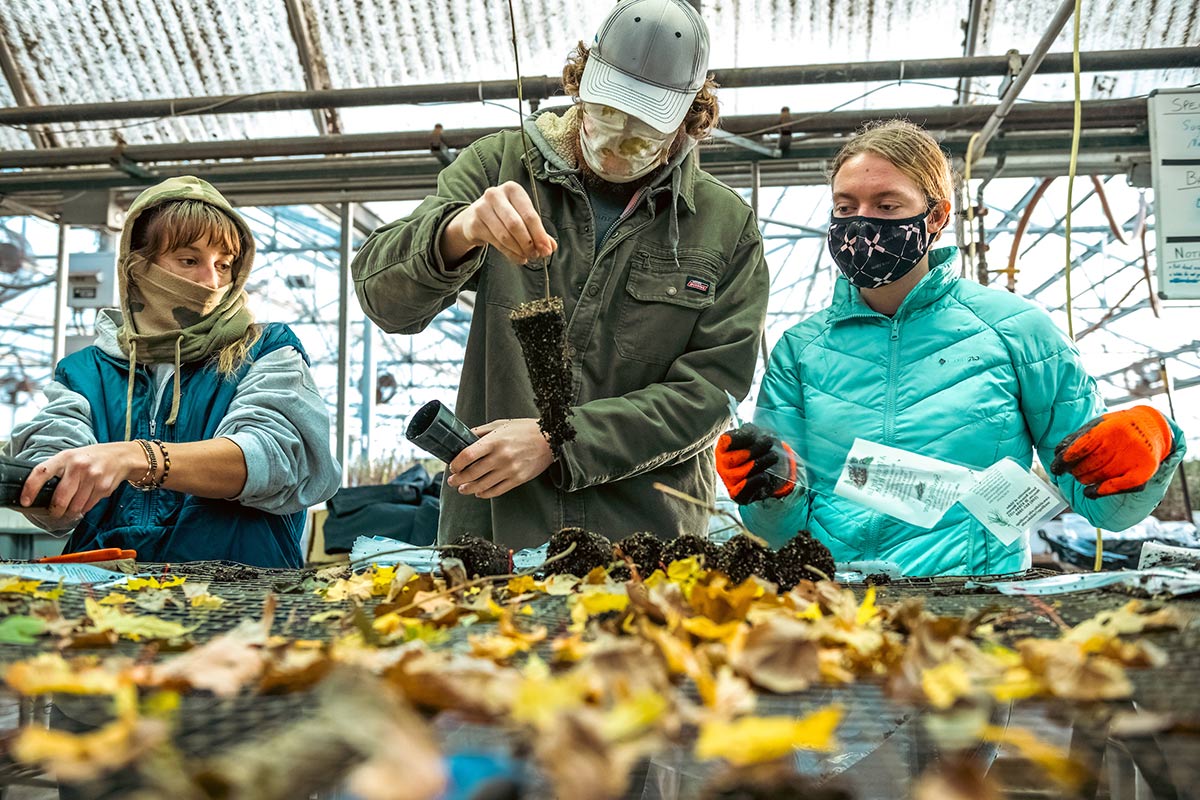U of I Forest Nursery Grows Careers
Growing a Budding Career
Matthan Hale and Shannin Murphy found a way to make the work they love into a career. Their jobs at the Pitkin Forest Nursery at the University of Idaho positioned them for insight into nursery management, reforestation and cultivation practices — and became the place where they developed management skills and became part of a close-knit network of nursery professionals.
Pitkin Nursery Helps Students Find Their Passion for Plants
In a small three-acre enclave east of University of Idaho’s Moscow campus, a smattering of greenhouses nestles in the rolling hills of the Palouse.
The university’s Franklin H. Pitkin Forest Nursery produces nearly 400,000 seedlings annually, including over 50 species of conifers, hardwoods and shrubs to be sold to customers throughout Idaho.
But the nursery, with its seven greenhouses and the accompanying hum of its fans and irrigation systems, doesn’t just cultivate plants, it fosters careers.
Pitkin nursery is one of just two university forest nurseries in the country where students are trained to raise seedlings for reforestation, an industry expected to burgeon over the next two decades.
A recent study shows that U.S. forest nurseries are short more than 2 billion seedlings annually that they need to meet the reforestation potential of the lower 48 states; an estimated 133 million acres should be replanted by 2040. A dearth of nurseries and qualified managers is part of the bottleneck.
U of I graduate Shannin Murphy didn’t consider a career planting trees when she enrolled at the College of Natural Resources to pursue a forestry degree.
Murphy was a nontraditional student studying forest ecology, timber harvesting and fire sciences.
“What I learned at Pitkin led to my career.” Shannin Murphy, manager of IFA Nursery, Aurora, Oregon
“I knew I wanted to do something with forestry and trees, but I wanted to help the forest more than remove timber from the forest,” said Murphy, now a nursery manager for IFA Nurseries in Aurora, Oregon.
When she learned U of I’s Pitkin forest nursery grew conifers to plant on acres of burned or harvested forestland, she found her calling.
“When I discovered Pitkin, I found a love for growing seedlings, and I realized this is exactly what I wanted to do,” she said.
After two years as an undergraduate student raising trees at the nursery, Murphy was hired at IFA, the largest conifer seedling producer in the Northwest, where she manages 47 greenhouses on a 23-acre facility.
“What I learned at Pitkin led to my career,” Murphy said.
Emily Behrens has worked at Pitkin nursery for more than four years and will graduate from U of I this year with a forestry degree and experience raising seedlings to reforest logging sites and restore wildlife habitat.
In addition to her training at Pitkin, Behrens works as an intern at the U.S. Forest Service nursery in her hometown of Coeur d’Alene, which grows trees for reforesting federal lands in Idaho, Montana and the Dakotas.
Along with her course work at U of I, Behrens’ experiences at both nurseries, along with her horticulture studies, set her on the career path she plans to pursue once she graduates.
“I really enjoy all aspects of working in a nursery,” Behrens said.
Deep Forestry Roots
Aram Eramian, superintendent of the U.S. Forest Service nursery in Coeur d’Alene, one of six such nurseries in the national forest system, works closely with the U of I nursery because it is among the few places he can turn to for experienced nursery workers.
“With the training they get at Pitkin, they are ready to produce seedlings,” Eramian said. “They are familiar with the process; they have all the basic knowledge — we just do things here on a larger scale.”
Eramian, who earned a degree in forest management at U of I, learned how to cultivate seedlings at Pitkin nursery before working there as a graduate student in the 1980s. He was a firefighter and silviculturist when the Forest Service was apprised of his nursery experience — knowledge that was in high demand.
“They said, ‘How would you like to develop seed orchards?’” he recalled. “That led me back to what I learned at Pitkin.”
Eramian started an orchard program at the Coeur d’Alene nursery in 1992 that produces blister-rust resistant white pine seeds.
Pitkin’s status as just one of two university-affiliated forest nurseries in the country makes it the perfect landing place for natural resource students, said Andrew Nelson, who operates the Pitkin program. Students earn a paycheck during the school year in addition to being trained in forest nursery know-how.
Students who graduate leave the nursery with a resume that includes seedling production and cultivation, giving them a good chance of finding work in an industry that can’t keep up with reforestation efforts required after logging or forest fires.
Andrew Nelson, Ph.D.
Associate Professor of Forestry, Director of Franklin H. Pitkin Forest Nursery, Tom A. Alberg and Judith Beck Endowed Chair of Native Plant Regeneration
Cultivating Careers
Although U of I does not yet offer a degree in forest nursery management, Nelson said students who work at the nursery through work-study and scholarship program, or to merely earn money as a side job, leave the university with a skillset they would be hard-pressed to gain elsewhere.
“We train about 40 students a year as a kind of a work force development program, and there is a big demand for our students,” Nelson said. “We’re the number one university that employers come to when they are looking for nursery experience.”
Nursery manager Don Regan, who earned a master’s degree at U of I, worked at Pitkin nursery as a graduate student in the late 1990s. He is now the nursery manager at Pitkin, fostering a philosophy that allows students to learn through hands-on experience.
“We act as mentors, answering students’ questions as they take on additional responsibilities,” Regan said. “It’s rewarding seeing the students increase their confidence and abilities as they learn about nursery operations.”
Many students who work at the nursery stay at Pitkin throughout their college careers.
“Many of these students now work in the natural resource field and maintain a great working relationship with the nursery.” Don Regan, Pitkin nursery manager
“They tell their friends about what a great experience they have working at the nursery,” Regan said.
There was a time when it was difficult filling job openings at the nursery, but that changed in recent years.
“When I post an opening these days, the pool of natural resource student applicant fills the first day,” he said.
Regan receives reference requests annually for students applying to internships or full-time jobs in the industry.
“Many of these students now work in the natural resource field and maintain a great working relationship with the nursery,” he said.
Ben Kaufman ’13 went through the Pitkin program while earning a bachelor’s in forest resources and climbed the ladder to a job that came with a lot of responsibility.
“I was in charge of irrigating the entire nursery,” Kaufman said.
It was an opportunity that he still remembers fondly.
“I cannot praise my education at Pitkin enough,” said Kaufman, who operates his nursery, HydroPonic, in Hawaii, where he raises Koa trees for reforestation. “All the little things I learned at the nursery, from how to cultivate seedlings to how to safely package and ship seedlings, have been so influential in starting my own nursery. I fell in love with every stage of nursery work.”
Research-Based, Student-Run
As Idaho’s state forest nursery, Pitkin minimizes competition with commercial forest nurseries in the state, Nelson said. Its production of Idaho commercial tree seedlings is relatively small, around a half million seedlings annually to be sold to approximately 1,200 customers, including nursery and private landowners.
The research-based and student-run nursery has the flexibility to test seedlings for resistance to climate changes, drought, extended cold spells and disease. Students sometimes collect seeds from trees in the U of I Experimental Forest.
“Our role is to develop hypotheses and research, prepare high-quality seedlings for trees and conduct plantings that build back our forests in the future,” Nelson said.
And, uniquely, the program develops students into exceptionally experienced forest nursery workers.
“If they stick around, they will get a view of the entire nursery production cycle and experience various aspects of it,” Nelson said. “We’re distinctive that way. It really sets us apart.”
Article by Ralph Bartholdt, University Communications and Marketing.
Photos by Melissa Hartley and Joe Pallen, University Photo Production.
Videos by Kara Billington and Will Knecht, University Video Production.
Published in January 2022.








